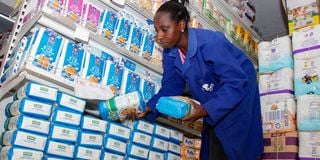More pain as rice, wheat flour prices to go up over new levy

An attendant arranges packets of maize and wheat flour at Bidii Supermarket in Elburgon, Nakuru County on February 03, 2024.
What you need to know:
- All cereals and legumes imported into the country have been slapped with a new levy.
- AFA enacted a 2 per cent levy on cereals on customs value for the importation of cereals.
Kenyans should expect high prices of rice and wheat flour starting this month after the government imposed 2 per cent levy on cereals’ customs value.
Beginning August 12, all cereals and legumes imported into the country were slapped with new levy introduced by the Agriculture and Food Authority (AFA) as traders protest on the more importation charges being introduced by government.
In the new charges, AFA enacted a 2 per cent levy on cereals on customs value for the importation of cereals and a 0.3 per cent levy for its exportation.
In the new directive, the authority has slapped same amount of levy on legumes/pulses while exports for roots and tubers will be charged a 1 per cent imports levy on customs value and 0.3 per cent on export.
The notice was made pursuant to regulation 37 of The Crops (Food Crops) Regulations of 2019, and the Authority which was to be effected from July 1st this year but was pushed to August 12 this year where it was implemented.
According to AFA, the mentioned levy will be paid directly to the authority’s agents at the nation’s point of entry or exit as the levies imposed will enable small scale food growers to favorably compete against imported produce.
Traders that failed to pay the levy were to face an interest of 25 per cent on the outstanding amount for the first month in which the trader defaulted.
Introducing export levy
With the new order, the customs value of cereals and legumes would see traders fork out an extra Sh20,000 on a truck of maize and Sh50,000 on a truck of rice on top of charges they have been paying to different government agencies such as Kenya Revenue Authority (KRA) Kenya Plant Health Inspectorate Service (Kephis) and Kenya Bureau of Standards (Kebs).
Apart from AFA levy, importers would be required to pay another Sh3,000 for an AFA permit to import cereals and legumes, a Sh600 import permit charge and Sh7,500 inspection fees to Kephis, Sh1,100 port health charge, Sh1,100 biosafety charges and Sh7,200 to Kebs for moisture and aflatoxin tests.
Shippers Council of East Africa CEO Agayo Ogambi said the charges are hindering facilitation of business growth and it would be an additional burden on our farmers and exporters who already pay a number of trade facilitation charges to the Kenyan government.
Mr Ogambi said there is a need for further stakeholders’ engagement as the levies will definitely increase consumer prices for imported cereals and introducing an export levy now would stifle this nascent recovery and undermine the efforts of Kenyan farmers and exporters to regain lost ground.
“The levies and more taxes on exports will make our products uncompetitive in East Africa and in COMESA as already Uganda and Tanzania are up in arms against the imposition of the levies,” said Mr Ogambi.
He added, “While AFA needs to raise revenues for the services provided, considerations must be made not to hurt consumers and also not to outprice our exports in the international markets.”
The CEO said Kenya must make a decision to support her exports and reduce levies and charges as they will have a negative impact on the ration of imports to exports which has remained at 5 containers imports against 1 container exports.
Imposing higher taxes
Chairman of the Kenya International Freight & Warehousing Association (KIFWA) Roy Mwanthi said importation of rice has stopped since AFA effected the levies on 12 August this year and it which will affect households as cost of rice is expected to increase.
“We anticipate serious shortage of rice and wheat due to the levies and those who import they will have to pass the cost to consumers. Currently rice from East African countries that would ordinarily be free are subject to high levies and is stuck in different border pints,” said Mr Mwanthi.
Mr Mwanthi said the recent commencement of imposition of levies on imports and exports of all food crops products from Kenya is very unfortunate as it is counterproductive and a huge non-tariff barrier to international trade in food crops
The chairman said imposing higher taxes and levies on the already levied crops on basic foods crops will result to reduction on importation of the dame which will lead to high cost of such basic items
This week, Tanzania traders protested Kenya’s move to levy their produce a 2 per cent on
But AFA Director General Bruno Linyiru said the protest has forced government to freeze on the levies for the EAC traders for a month to allow the regulator to address concerns raised who are opposing on it.
Since 2022, the government had rolled back taxes on food imports to slash the cost of essential products such as flour and rice. At the beginning of this year, Kenya imported food products such as wheat, rice, maize, and sugar worth $172,393 million from Uganda, South Africa, European countries, India, and the United States, according to AFA.





